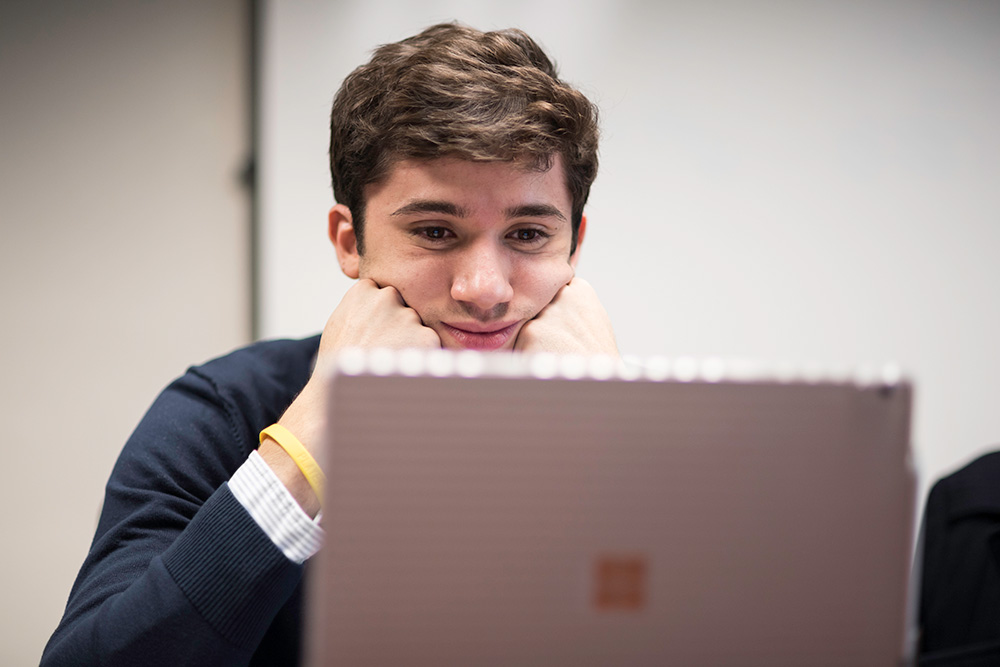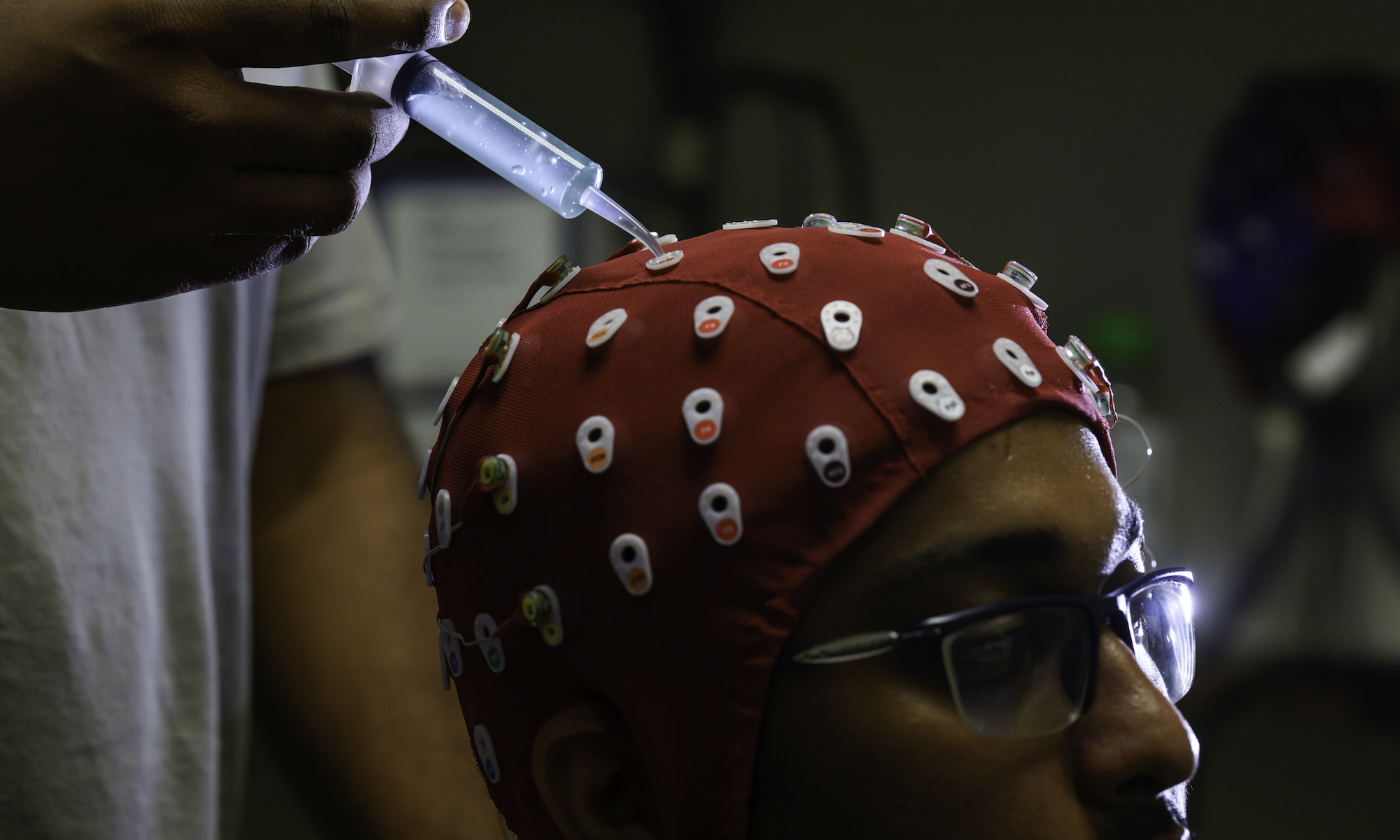University’s annual hackathon, 36-hour marathon of data-crunching and problem-solving, runs this Friday through Sunday.
Anis Kallel ’17 received a Renaissance & Global Scholarship from the University four years ago. The full-tuition, four-year scholarship is offered annually to about 20 students who are academic all-stars and have unique backgrounds that add to the diversity of the student body.
Kallel was shocked and thrilled. But mostly, he was grateful.
“I was given something most people wouldn’t dream of receiving,” the computer science and business dual major from Tunisia says. “That comes with some responsibility. Whatever potential Rochester saw in me, I wanted to live up to it.”
Kallel has enjoyed his college experience from all angles.
He is president of the Computer Science Undergraduate Council and a teaching assistant and peer adviser in that department. He was a research assistant in the Human-Computer-Interaction lab, where he helped develop RocSpeak, a software program that helps people improve their public speaking skills.
He worked at the UR Tech Store and was a member of Rochester’s club volleyball team. He landed internships at Electronic Arts, a video game company based in Redwood City, California, and Microsoft, the technology giant based outside of Seattle. He studied abroad in Spain, where he added Spanish as his fourth language, and is a member of Roc HACK, a club for hackers, engineers, and builders.
And he is one of the organizers for the University’s annual hackathon, a 36-hour marathon this Friday through Sunday in the ballroom of Frederick Douglass Commons. The lead organizer is Maggie Curtis ’17.
The first hackathon at the University, a 24-hour event held in 2014, drew 25 students. DandyHacks 2017 is expected to bring in 250 participants, as individuals or in small teams, from colleges throughout New York state and Canada.
“It typically attracts people with technical backgrounds, but it’s open to students with different skills who are passionate about solving any problem with data,” Kallel says. “You decide what problem you want to solve, starting from scratch, and present a solution at the end of the event.”
Free registration begins at 5 p.m., and hacking starts at 7.
First prize is $500, and sponsors include Google, 1010data, and FactSet, along with the Rochester Career Center for Learning, the Computer Science department, and the Hajim School of Engineering. Many technical companies send recruiters.
Kallel is the son of an engineer and attended the prestigious Pioneer School of Ariana, where students attend school six days a week and study 13 mandatory subjects. The graduation rate is near 100 percent.
“It’s a very demanding school,” he says. “But I realize I was privileged to go there. In some poor areas, kids go to boarding schools with very limited budgets. They go to boarding schools and live at the schools. They don’t have access to warm water, or food that’s rich in protein, basic human rights problems that shouldn’t exist in the 21st century.”
Kallel is passionate about Tunisia, a country of around 11 million people in North Africa six years removed from a revolution.
“We’ve gone through a lot of change,” he says. “We voted on a progressive constitution and have a lot of freedoms that weren’t there before. It’s a very politically active country now, and I take pride in the progress we’ve made so far.”
Kallel is part of a non-governmental organization called Wallah We Can, whose goal is to rehabilitate all 330 public boarding schools in Tunisia and transform the students’ educational experience.
“We’ve already created a successful model,” Kallel says. “Now we want to see the impact on students’ lives.”
Kallel came to Rochester by chance. One day in 2013, he and some high school friends took an online survey that promised to match them with a suitable college in the United States. Kallel answered questions about areas of study and activities he was interested in.
“Rochester came back as a 100 percent match,” he says.
Jonathan Burdick, dean of admissions and financial aid, says Kallel was the first Tunisian to enroll at Rochester in the 14 years he’s served in admissions here. Four others have followed.
“Anis is extraordinary, and only partially because of his talent and ambition,” Burdick says. “He’s also demonstrated to me time and time again that he is a compassionate, caring, charismatic student.”
Burdick visited Kallel in Seattle last summer, when the student was working long hours for Microsoft.
“He managed to carve out time to meet me for dinner,” Burdick says, “and only near the end did I realize it was his birthday.”
Kallel has inspired Burdick to visit as many different African countries as he can in support of developing African entrepreneurship.
“One of those places, I hope, will be my first recruiting trip to Tunisia,” Burdick says.
Kallel will remain part of the University community next year as a Kauffman Entrepreneurial Year student. The KEY program allows selected students the chance to devote one or two semesters tuition-free to the study and practice of entrepreneurship.
“I didn’t want to jump into the Silicon Valley industry right away,” Kallel says. “I wanted to do research on emerging markets in Africa.”
He’ll work as a co-op for Seedstars World, a Swiss startup company, and is scheduled to visit 24 cities in 20 countries from May to December before returning to Rochester.
“Then, I’ll compile my experience and put it all into perspective,” he says. “I’ll see what worked in other countries. I want to make a difference—in Tunisia and everywhere.”




